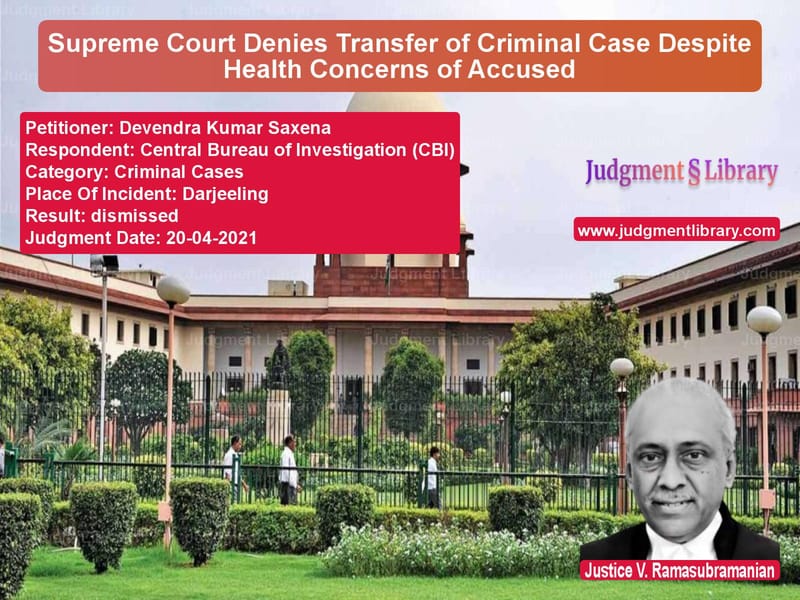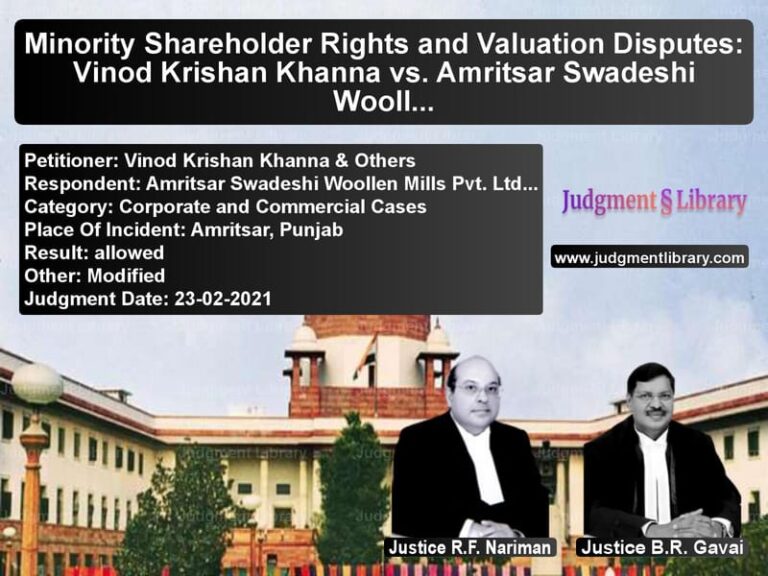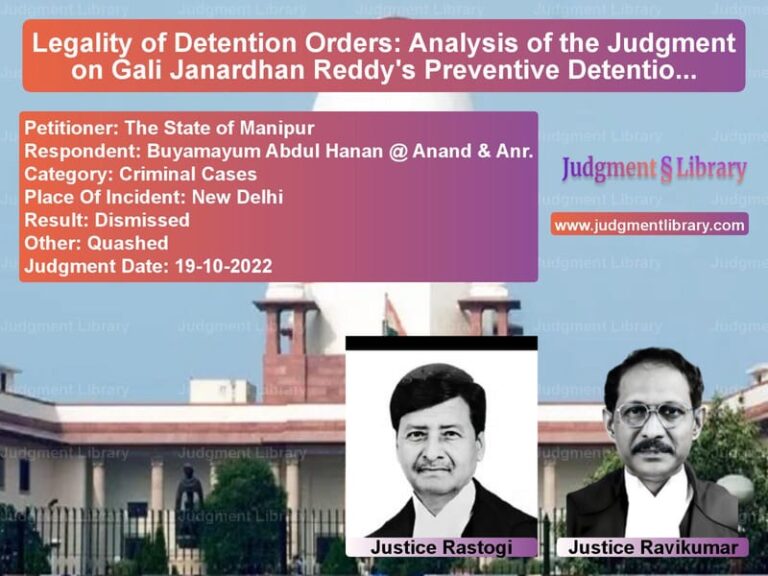Supreme Court Denies Transfer of Criminal Case Despite Health Concerns of Accused
The Supreme Court of India recently delivered a judgment in Devendra Kumar Saxena v. Central Bureau of Investigation (CBI), a case involving the transfer of criminal cases from Darjeeling to New Delhi. The petitioner, Devendra Kumar Saxena, a retired Chief Engineer of the Central Public Works Department, sought to transfer two criminal cases in which he and his wife were accused. The cases were being heard in Darjeeling, and the petitioner argued that his health condition, which included severe paralysis and brain stroke, justified the transfer to New Delhi.
Background of the Case
Devendra Kumar Saxena, the petitioner, was charged with corruption-related offenses under the Prevention of Corruption Act, 1988, in two separate cases. The first case, Special CBI Case No. 18 of 2012, was based on charges under Sections 120B of the Indian Penal Code (IPC) and Sections 7 and 13(2) read with 13(1)(a) and 13(1)(d) of the Prevention of Corruption Act. The second case, Special CBI Case No. 41 of 2012, involved similar charges under Section 109 IPC and Sections 13(2) and 13(1)(e) of the Prevention of Corruption Act.
The petitioner’s primary argument for the transfer was his declining health, which made it difficult for him to travel from Darjeeling to attend court hearings. He also claimed that he required constant assistance due to his physical condition. Additionally, the petitioner sought the transfer of both cases to New Delhi, as he argued that attending hearings in Darjeeling would be physically and mentally exhausting for him.
Petitioner’s Arguments (Devendra Kumar Saxena)
- The petitioner argued that his health condition, which included paralysis and a brain stroke, made it impossible for him to travel to Darjeeling for court hearings.
- He contended that due to his medical condition, he needed an attendant to assist him in basic tasks, and attending court proceedings in Darjeeling would further deteriorate his health.
- The petitioner also highlighted that he had already suffered significant physical setbacks and could not participate actively in the proceedings from Darjeeling, which affected his ability to defend himself.
- He emphasized the importance of a fair trial, which could be meaningfully conducted only if he was able to participate in the proceedings fully.
Respondent’s Arguments (CBI and Co-Accused)
- The Central Bureau of Investigation (CBI) argued that the charges against the petitioner and his wife were serious and the case had already been delayed due to various proceedings.
- The CBI contended that although the petitioner’s health issues were recognized, the transfer request could not be justified solely on medical grounds, as the legal process must continue without undue delay.
- The co-accused, Respondents No. 2 and 3, argued that the transfer of the case to New Delhi would cause hardship to them, as they too had health concerns and would be severely impacted by having to travel for hearings in New Delhi.
- The respondents further argued that the transfer of the case was an attempt to delay the proceedings and that the case should proceed in Darjeeling, where it had been initiated.
Supreme Court’s Analysis and Judgment
The Supreme Court carefully examined the arguments presented by both sides. While acknowledging the health issues of the petitioner, the Court noted that the transfer of the cases should not be allowed on grounds that could undermine the trial process. The key observations made by the Court included:
- “The right to a fair trial is paramount, but it must be balanced with the need to ensure that legal proceedings are not unduly delayed. The health of the accused is a valid consideration, but it should not become a ground to stall the legal process.”
- “The Court recognizes that the petitioner’s health is a serious concern, but it also acknowledges that the remaining witnesses in the cases are already scattered, and the transfer of proceedings would not serve the interest of justice.”
- “While the petitioner’s medical condition is taken into account, it does not warrant the transfer of the case from Darjeeling to New Delhi, especially after significant progress has been made in the trial.”
- “It would be unfair to the co-accused and others involved in the case to allow the transfer request solely based on the petitioner’s medical condition, as this would cause undue inconvenience and delay for them as well.”
The Court also addressed the availability of technology and noted that online participation could be considered in the event that the petitioner could not attend the proceedings physically. The Court directed that the trial court should consider granting the petitioner the option to attend proceedings virtually if required.
In conclusion, the Supreme Court dismissed both transfer petitions, noting that despite the petitioner’s health condition, there was no sufficient legal basis to transfer the criminal cases from Darjeeling to New Delhi. However, the Court directed that the trial court should ensure that the petitioner’s personal appearance was dispensed with, except when necessary, and allow virtual participation where possible.
Key Legal Principles Reinforced by the Judgment
- Health and Fair Trial: The ruling emphasizes that health concerns of the accused are a valid consideration, but they should not be used as a pretext for delaying the trial or causing inconvenience to other parties.
- Transfer of Cases: The judgment reiterates the Court’s discretion in granting a transfer of cases, which should be based on the interest of justice and not merely on personal or health grounds.
- Use of Technology in Court Proceedings: The Court’s reference to virtual hearings signals an openness to utilizing technology to facilitate participation in trials, particularly in cases where the accused’s health prevents them from physically attending.
Impact of the Judgment
The judgment is a significant one for criminal trials in India, as it reaffirms the importance of the balance between an accused’s health and the need for the trial to proceed without unnecessary delays. The decision ensures that health concerns are addressed but not at the cost of stalling the judicial process. Moreover, it sets a precedent for the use of technology in courtrooms, allowing accused persons who cannot attend in person to still participate meaningfully in their trial.
Conclusion
The Supreme Court’s decision in Devendra Kumar Saxena v. Central Bureau of Investigation (CBI) highlights the importance of balancing the health needs of an accused with the timely conduct of legal proceedings. While recognizing the petitioner’s health issues, the Court emphasized that legal proceedings should continue efficiently, ensuring that justice is not delayed. The ruling sets important precedents for the handling of cases where the accused has health concerns and ensures that fairness in the trial process is upheld.
Petitioner Name: Devendra Kumar Saxena.Respondent Name: Central Bureau of Investigation (CBI).Judgment By: Justice V. Ramasubramanian.Place Of Incident: Darjeeling.Judgment Date: 20-04-2021.
Don’t miss out on the full details! Download the complete judgment in PDF format below and gain valuable insights instantly!
Download Judgment: devendra-kumar-saxen-vs-central-bureau-of-in-supreme-court-of-india-judgment-dated-20-04-2021.pdf
Directly Download Judgment: Directly download this Judgment
See all petitions in Bail and Anticipatory Bail
See all petitions in Money Laundering Cases
See all petitions in Terrorist Activities
See all petitions in Judgment by V. Ramasubramanian
See all petitions in dismissed
See all petitions in supreme court of India judgments April 2021
See all petitions in 2021 judgments
See all posts in Criminal Cases Category
See all allowed petitions in Criminal Cases Category
See all Dismissed petitions in Criminal Cases Category
See all partially allowed petitions in Criminal Cases Category







